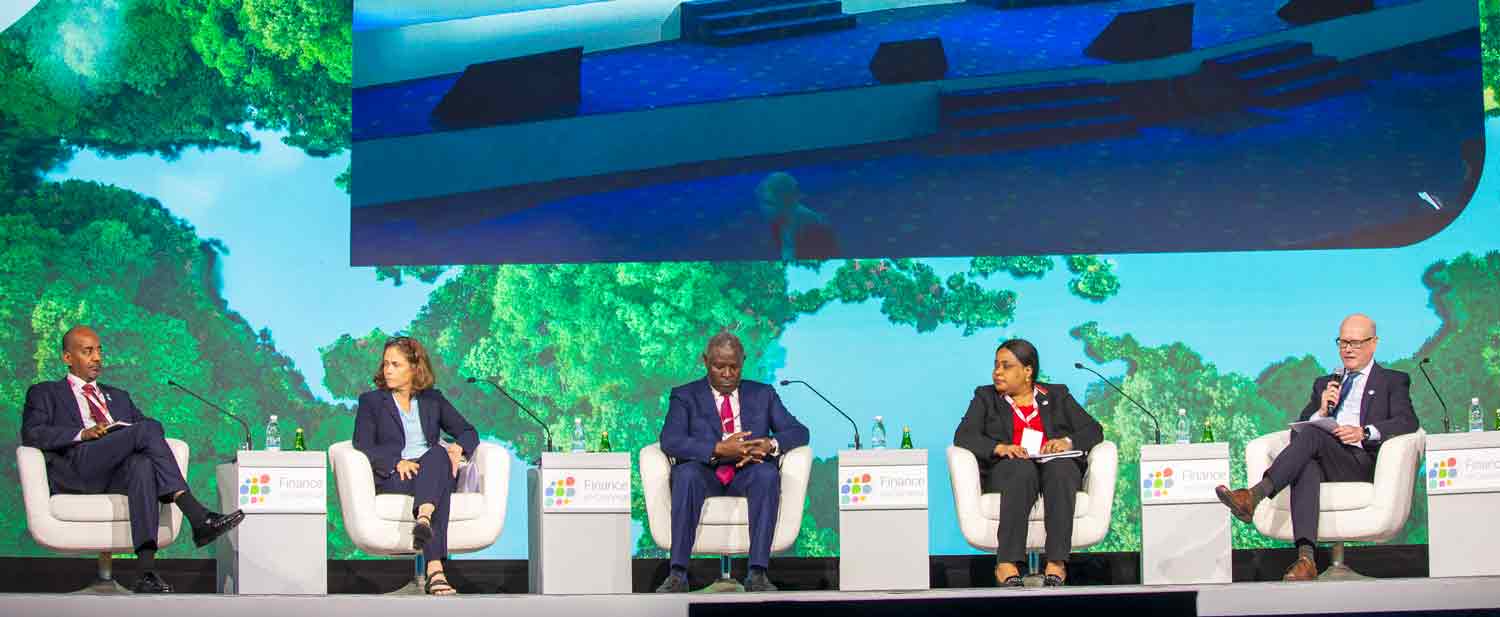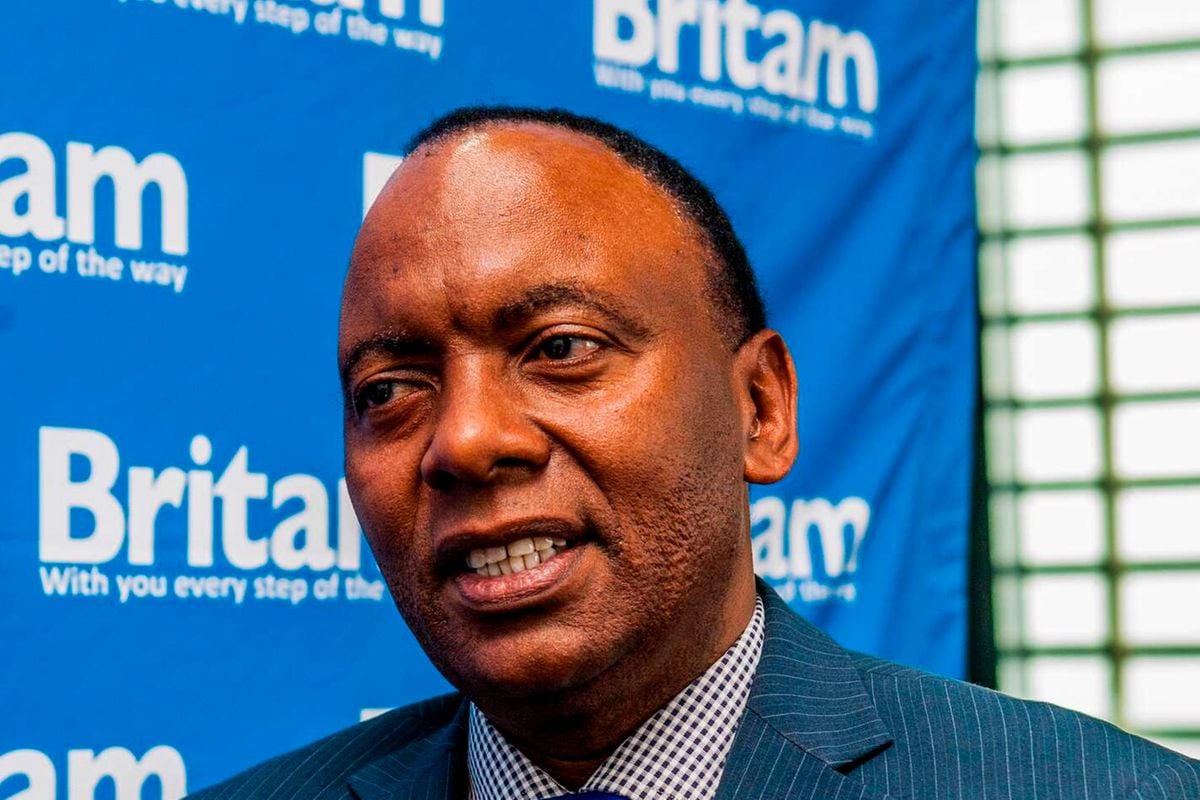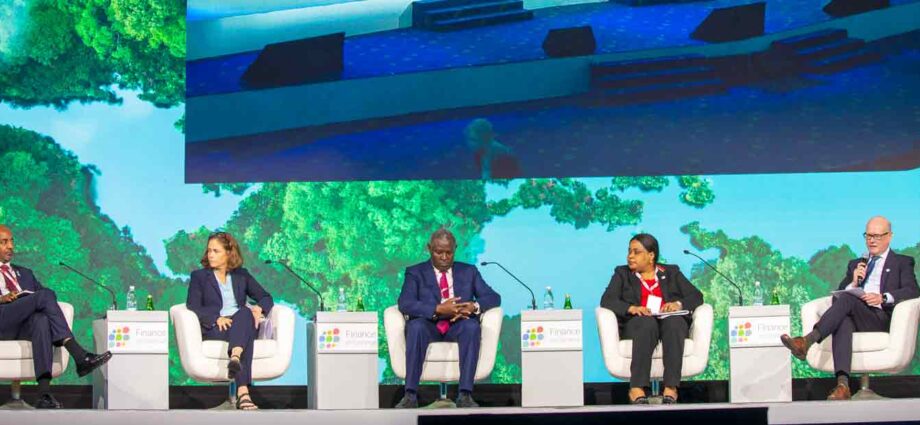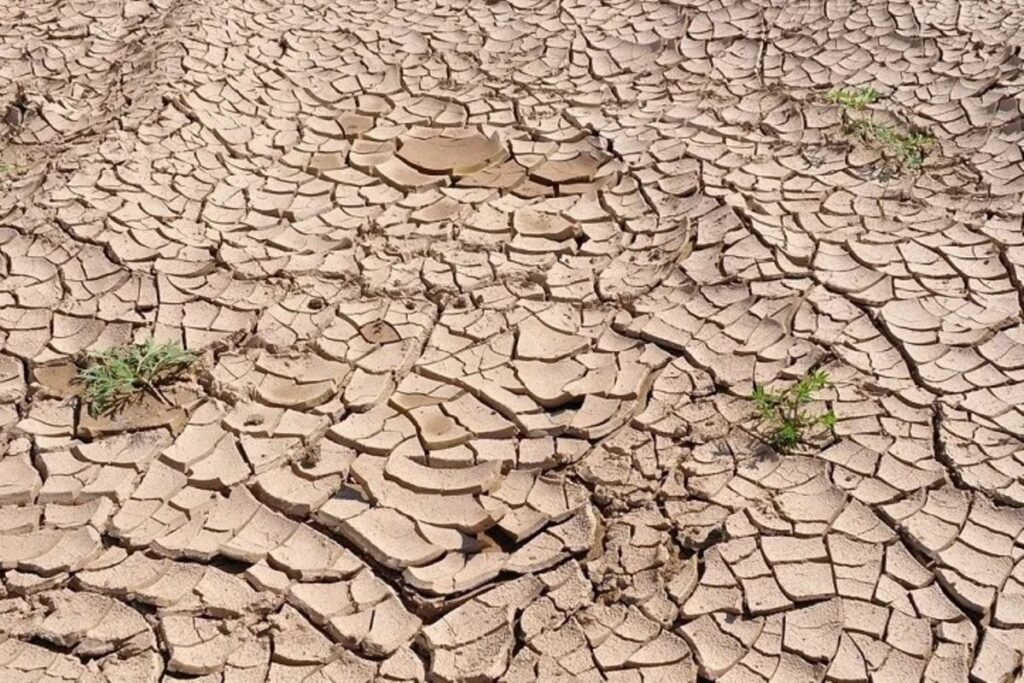
Development lenders in Africa can seize the current global crises as an impetus to help the continent significantly increase food production. This was a common conclusion of panelists at this year’s Finance in Common summit in Abidjan on Wednesday.
Participants agreed that development partners should work with governments and other policymakers to bolster the resilience of private businesses, especially those led by women.
The panelists included Beth Dunford, Vice President for Agriculture, Human and Social Development at the African Development Bank; Ijeoma Ozulumba, Executive Director and Chief Financial Officer of the Development Bank of Nigeria; James Mwangi, Group Managing Director and CEO of Kenya-based pan-African Equity Group Holdings; and Admassu Tadesse, CEO of Trade and Development Bank.
The panel discussion, unlocking smart and inclusive Recovery in Africa through the private sector, was one of several at the three-day summit that looked at how multilateral development banks can bring tangible solutions to Africa’s development challenges.
The African Development Bank and the European Investment Bank co-organized the summit under the theme; Green and Just Transition for a Sustainable Recovery to highlight the role of public development banks in Africa’s recovery as the continent faced impacts from the Covid-19 pandemic, climate change, and Russia’s war in Ukraine. The meetings are taking place less than a month before the UN climate conference, COP27, gets underway in Sharm el Sheikh, Egypt.
Dunford highlighted various initiatives by the African Development Bank to enhance financial inclusion, particularly by empowering women through digitization and capacity-building to make their activities bankable.
She said many women in business in Sub-Saharan Africa find it challenging to obtain affordable credit because of a misconception that their gender makes them high-risk borrowers. Dunford said the African Development Bank was working to change the mindset that categorizes women as not being creditworthy.
“At the African Development Bank and in our gender strategy, we’re looking into women’s economic empowerment across everything we do,” Dunford stressed. She added: “With every operation at the bank, there is the recognition that women’s empowerment is the key for delivering on growth. The strategy is paying off by reducing poverty among families.”
Dunford said that the bank’s Affirmative Finance Action for Women in Africa (AFAWA) program maintained its goal to bridge the $42 billion financing gap for women.
She said the African Development Bank was also making sure there is space for the private sector as governments turn to the domestic market to mobilize credit amid tightening global conditions.
Tadesse said Africa must use climate action to spur agriculture and climate-resilient infrastructure to rapidly boost food production.
He said: “What really needs to be done now is refocusing on supply-side measures because climate change, the Covid-19 pandemic and the new shocks coming from the war in Ukraine have left behind serious supply problems. That’s what is driving inflation, food insecurity, and energy insecurity and all fronts.”.
The Trade and Development Bank CEO said that the current food losses represent 8% of greenhouse emissions and that addressing them would be climate action. “If we’re just to invest in agriculture, storage, and cold chains, just to stem the losses, that will significantly contribute to addressing climate change.”
Tadesse reiterated the call for channeling more International Monetary Fund Special Drawing Rights to Africa. “We want to see more SDRs flow through Africa, and if it doesn’t flow, then it will be an opportunity lost.”
Mwangi called for a stronger collaboration between countries and development partners for rapid recovery. “I am seeing us moving more and more into scenario planning, and as the situation evolves very quickly, working together and learning with each other will see us grow,” he said.
Panelists also discussed current exchange rate volatilities, increasing costs of credit, and good governance in managing the development of financial institutions. Drawing from the Development Bank of Nigeria’s experience, Ozulumba said: “Governance is central to building a development bank, and Nigeria is a good role model with efficiency in operations.”
European Investment Bank Vice President Thomas Östros moderated the panel.
Source: afdb.org
Share this news
This Year’s Most Read News Stories

ACT Unaware of Mwinyi’s joint committee on Zanzibar reforms
Opposition party ACT Wazalendo has said it is not aware of a special committee on reforms and has directed the party’s leadership to follow up on the decision of the Central Committee which directed its leaders to meet with President Hussein Ali Mwinyi.Continue Reading

Britam half-year net profit hits Sh2bn on higher investment income

Insurer and financial services provider Britam posted a 22.5 percent jump in net earnings for the half-year ended June 2024, to Sh2 billion, buoyed by increased investment income.
The rise in half-year net profit from Sh1.64 billion posted in a similar period last year came on the back of net investment income rising 2.5 times to Sh13.27 billion from Sh5.3 billion.
“We are confident in the growth and performance trend that Britam has achieved, supported by its subsidiaries in Kenya and the region. Our business is expanding its revenue base while effectively managing costs,” Britam Chief Executive Officer Tom Gitogo said.
“Our customer-centric approach is fueling growth in our customer base and product uptake, particularly through micro-insurance, partnerships, and digital channels.”
The investment income growth was fueled by interest and dividend income rising 34 percent to Sh9.1 billion, which the insurer attributed to growth in revenue and the gains from the realignment of the group’s investment portfolio.
Britam also booked a Sh3.79 billion gain on financial assets at a fair value, compared with a Sh1.8 billion loss posted in a similar period last year.
The increased investment income helped offset the 12.7 percent decline in net insurance service result to Sh2.13 billion in the wake of claims paid out rising at a faster pace than that of premiums received.
Britam said insurance revenue, which is money from written premiums, increased to Sh17.8 billion from Sh16.6 billion, primarily driven by growth in the Kenya insurance business and regional general insurance businesses, which contributed 30 percent of the revenue.
The group has a presence in seven countries in Africa namely Kenya, Uganda, Tanzania, Rwanda, South Sudan, Mozambique, and Malawi.
Britam’s insurance service expense hit Sh13.6 billion from Sh11.3 billion, while net insurance finance expenses rose 2.6 times to Sh12.3 billion during the same period.
“Net insurance finance expenses increased mainly due to growth in interest cost for the deposit administration business driven by better investment performance. This has also been impacted by a decline in the yield curve, which has led to an increase in the insurance contract liabilities. The increase has been offset by a matching increase in fair value gain on assets,” said Britam.
Britam’s growth in profit is in line with that of other Nairobi Securities Exchange-listed insurers, which have seen a rise in profits.
Jubilee Holdings net profit in the six months increased by 22.7 percent to Sh2.5 billion on increased income from insurance, helping the insurer maintain Sh2 per share interim dividend.
CIC Insurance Group posted a 0.64 percent rise in net profit to Sh709.99 million in the same period as net earnings of Liberty Kenya nearly tripled to Sh632 million from Sh213 million, while Sanlam Kenya emerged from a loss to post a Sh282.2 million net profit.

Huduma Zimezorota Hospitali Ya Rufaa Mnazi Mmoja Zanzibar
Huduma katika Hospitali ya Rufaa ya Mnazi Mmoja Zanzibar zimezidi kuzorota huku wananchi wengi wakilalamikia uongozi wa Hospitali hiyo na watendaji wake.Continue Reading












